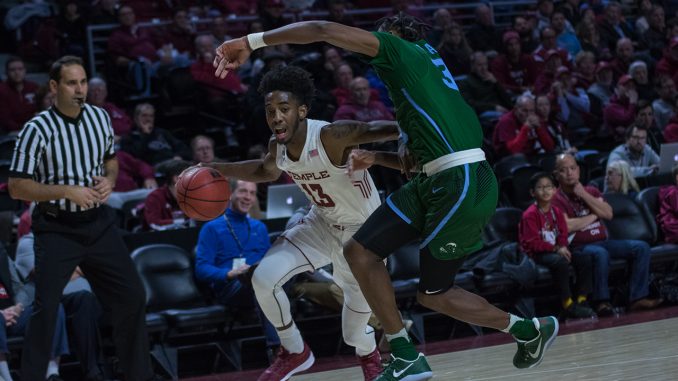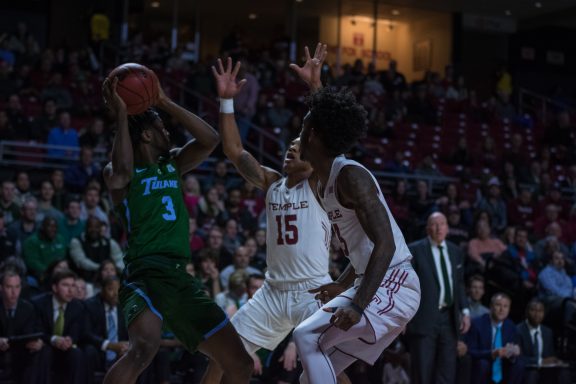
Tulane coach Mike Dunleavy Sr. sees similarities in his team and Temple’s squad.
The Green Wave (14-16, 5-13 American Athletic Conference), who are the No. 10 seed, and No. 7 Temple (16-14, 8-10 The American) will face each other for the third time this season in Thursday’s American Athletic Conference tournament first-round game at 7 p.m. in Orlando, Florida.
“If you look at our lineups and our matchups, we’ve got a stretch four in [redshirt senior] Cam Reynolds,” Dunleavy said during Monday’s conference coaches teleconference. “We’ve got a guy at the small forward that’s very athletic in [junior] Melvin Frazier. They’ve got [sophomore guard Quinton] Rose. Probably the area of the game where I would say that they have any advantage on us is that they’re a much deeper team.”
Temple and Tulane split their regular-season matchups. The Green Wave beat the Owls, 85-75, on Dec. 28 at the Liacouras Center, and Frazier played a large role.
He scored 25 points for one of his 10 games this season with 20 or more points. Frazier made all six of his free-throw attempts and shot 9-for-13 from the field in 38 minutes.
When Dunleavy took over Tulane’s program two seasons ago, he saw that Frazier had “incredible athletic ability” and “a really big motor in terms of his effort.”
But what Frazier lacked was the ability to make plays and finish at the rim with his left hand. Frazier averaged 15.9 points per game and shot 38.6 percent from 3-point range this season to make The American’s second-team.
A joke Dunleavy made about Frazier’s difficulties with his left-handed skills helped give him the drive to improve, he said.
“He laughed it off, but I think it kind of got to him a little bit and he worked extremely hard on that,” Dunleavy said. “If you watch our games now, you’ll see that he finishes real strong with his left hand, a lot of times high off the glass. He can play pick and roll and make plays, and his shooting has greatly improved.”
“He’s a load out there because he’s so long and so quick and so savvy at the game,” coach Fran Dunphy said before Tuesday’s practice at Pearson Hall. “We can not only score it, but he impacts the game in every aspect, whether it’s defensively or rebounding or actually making his teammates better. So he’s a real tough matchup for us.”
Frazier started on Feb. 4, when Temple beat Tulane, 83-76, in New Orleans, but he only played four minutes due to a chest injury. He missed the Green Wave’s next game but returned shortly after. He closed the regular-season by averaging 16 points per game in his final five appearances.
Frazier and four other Tulane players average double figures. Reynolds’ 14.8 points per game ranks second on the team. The three other players average about 10 apiece. Redshirt-sophomore forward Samir Sehic averages 10 points per game off the bench and shoots 57.2 percent from the field.
Dunleavy said his team’s biggest strength is its uptempo pace and ball distribution. Tulane’s 15.5 assists per game rank third in The American behind Wichita State and Cincinnati, which finished the season as the conference’s top two teams and ranked in the Associated Press Top 25 Poll.

“We move the ball,” Dunleavy said. “We create good shots for each other. When we’re making shots, we’re a pretty good team.”
“Games where we defend well, then we play at a fast pace, again because we’re getting rebounds, we’re getting the basketball, we’re getting out,” he added. “So if we don’t defend though, …then we’re taking the ball out of the net and you’re playing against a set defense all the time.”
Given the teams’ familiarity with each other, Temple is working on adding a few wrinkles on offense so it can make in-game adjustments.
“I think that comes out of how teams guard you,” Dunphy said. “Let’s say it’s another two or three bounces or two or three passes that wear the defense down a little bit more. Be a little bit more patient, and maybe at the end of the shot clock you can get yourself a cleaner look. So that’s what we’ll work on over the next couple of days.”


Be the first to comment